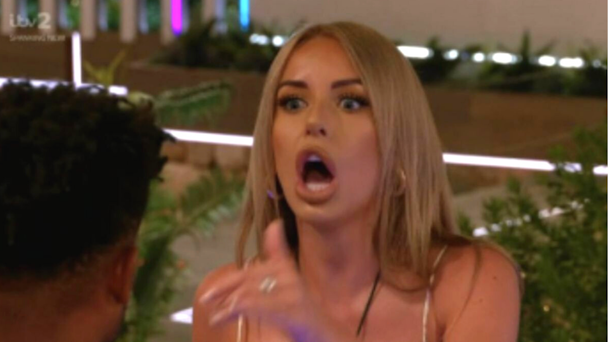Love Island’s record Ofcom complaints unlikely to rattle sponsors – for now
This week, Ofcom revealed that it had received a record number of complaints about ITV’s flagship program Love Island following a fight between two contestants. An investigation may yet be launched, but it’s unlikely to spook sponsors like Boots, Just Eat and Tinder.

Will brands think twice after surge in Love Island complaints?
On Wednesday, TV regulator Ofcom said it had received almost 25,000 complaints over an episode that aired the previous week in which two contestants had an argument.
The show’s producers had created a ‘challenge’ where the contestants were played unseen clips of what others had said or did. Teddy Soares was shown telling another contestant that he was attracted to her, leading love interest Faye Winter to embark on an expletive-laden outburst.
Viewers were quick to criticize the apparent orchestrating of the argument by show bosses, as well as their failure to step in when they felt it was out of hand.
It’s the latest in a long line of issues Love Island creators have faced after a spotlight was put on the duty of care it has toward contestants following the suicides of two individuals who had previously appeared as contestants. As a result, viewers have been more inclined to complain when they witness content they’re not comfortable with.
In the past five weeks, only 15 programs across the whole of commercial television and radio received more than 50 complaints. Eleven of them were episodes of Love Island.
“We’ve received a high volume of complaints about last week’s Love Island, which is consistent with a trend of growing complaints about high-profile TV shows. We are carefully assessing the complaints we’ve received, before deciding whether or not to investigate,” said a spokesperson for Ofcom.
Social media analysis indicates that people are swayed by what they see around the show. Research from HypeAuditor found that the most liked post since the start of the series is from the official Love Island Instagram feed responding to unacceptable viewer comments posted online.
The episode in question, airing August 6, resulted in the greatest volume of posts, showing the event provoked a strong reaction.
Furthermore, research from Synthseio saw a rise in negative sentiment posted toward the show after the event. Over the last week, there have been more negative posts than positive ones (51,060 v 53,100). Meanwhile over the last three months, the figure sits at 948,100 v 936,900 respectively. It’s the first time negative chat has overtaken positive in the show’s run so far.
Brand impact
Mihir Haria-Shah, head of broadcast at Anything Is Possible, points out that TV is one of the most ‘brand-safe’ environments as advertisers know where there spots are going to air and as such can instruct buyers to avoid channels/content that they may deem not to align with their brand ethics. There’s been a few clashes here, be it Piers Morgan on GMB, the Jeremy Kyle show being axed and the emergence of GB News and Farage’s comments on RNLI.
He says: “Love Island is no stranger to these concerns, especially with concerns over the contestants’ mental health after being part of the show – ITV has repeatedly ensured that it does everything in its power to protect the contestants.”
Brands meanwhile are having to balance the tastefulness of the content with the sheer scale of the valuable audience it brings. “Love Island is undoubtedly one of the top three performing TV shows for that hard-to-reach 16-34-year-old audience. For brands to engage with the younger audience, it is a no-brainer to buy TV spots in the program. Given that Love Island has been around for a number of years, advertisers will know the type of content they will have a presence in and they’re not avoiding suggesting that they don’t see it as a detriment to their brand health.”
He points out that there’s more risk to the sponsors than the many advertisers appearing during its ad breaks. “We talk a lot in the TV world about ‘signalling’ e.g. having presence in shows or certain TV channels gives off different brand signals, such as quality, affluence or financial stability, of that brand, but in reality are viewers likely to build up a perception of a brand based on a program they have appeared in?”
The show runs for an eight-week period and sponsor messages will be repeated so frequently that there will be rub-off between both. In instances of backlash, there can be negative connotations.
He’s spoken to brands in the past that said the show doesn’t align with their brand ethics. He’s had to remind them that they are potentially missing out on a huge opportunity to reach the younger audience who don’t watch as much TV.
“I have definitely worked on brands that wanted to avoid the likes of Jeremy Kyle and Big Brother at all costs, but would most likely advertise in something like Love Island. The reason being the audience but also because of ITV’s reassurances of looking after the mental health of the Islanders.”
If ITV’s commitment to protect the contestants rings hollow, however, he could see more hesitancy to sponsor or appear around the property. “More brands are conscious of it and talking to us about it. Some brands have actually used their spots in Love Island to challenge it – e.g. Dove with a body positivity advert.”
Ed Cox, founder and managing Yonder Media, said it is increasingly looking at the suitability of reality TV, especially with regards to the mental health of participants.
He adds: “Love Island, in particular, has been in the public eye with some high-profile tragedies around the program, which have to come into consideration. Obviously with TV being a heavily-regulated medium there is a much higher degree of brand safety and editorial standards than, say, YouTube or Facebook, so it’s not in the same category of supporting fake news or appearing next to anti-vaxxer content.”
However, he believes that if advertisers “keep supporting content that has a harmful effect (on contestants, or society at large) then TV stations will continue to commission these programs”.
Cox notes that for big topic stuff like our current Housing Emergency campaign for Shelter, it has been cherry-picking spots on TV and articles in the newspapers. “It’s about effectiveness as much as ethics – we know that where the ad appears can have a big impact on recall and message takeout.”
Emma Banks, planning director, St Luke’s, points out that ITV has been taking the “high ground” on mental health in recent months with its ‘Get Britain Talking’ campaign. It has promised the public to “take the welfare of its Love Island contestants more seriously by introducing a series of measures to combat its toxic past”.
Banks finds ITV’s response to the arguement “unsatisfactory” and wonders if the company is “more interested in monetizing drama than in genuinely championing mental health”.
She thinks that the public is becoming savvier to brands that promise to make the world a better place and fail to deliver. “It seems that after the toughest year in living memory, the straw has broken the camel’s back and the massive volume of complaints from the public is our sign that consumers will no longer put up with that kind of inconsistency.”
The Drum approached key sponsors of Love Island including Tinder, Boots, Just Eat and I Saw It First. They either declined to comment or did not respond in time for this article’s publication.

